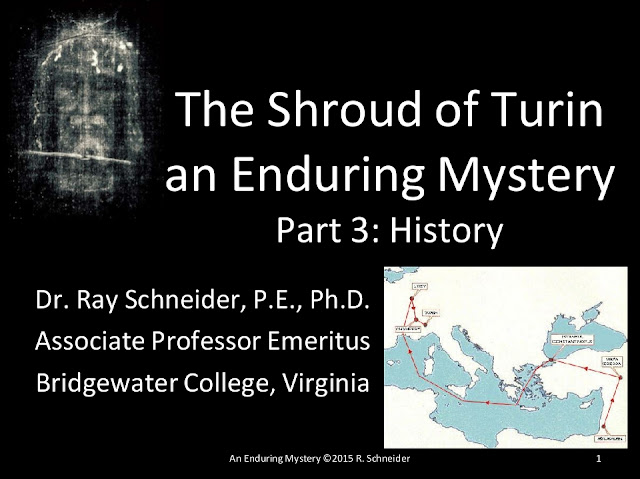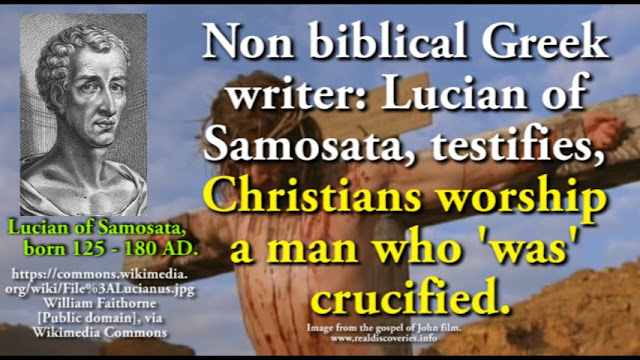We continue with non biblical writers outside the Bible who confirm the Bible.
Here we have another second century Greek writer:
Lucian of Samosata, born 125 - 180 AD.
Who makes some amazing statements regarding who Christians worship.
Lucian of Samosata is well documented in history and is believed to be the author of 70 ancient writings.
Lucian of Samosata confirms and states in his writings:
The Passing of Peregrinus or The Death of Peregrinus.
1. There are Christians.
2. The Christians worship a man in his day.
3. The Christians believe a man who they worship started Christianity.
4 The Christians believed and followed His teachings.
5. The person the Christians followed 'was' crucified.
6. The Christians believe they will live forever because of their faith in this crucified man.
7. The Christians do not worship any other God except this crucified man.
8. The Christians have no care for material things because of their strong faith.
9. The Christians become brothers when they are converted.
10. He preached to the priests and scribes at Palestine which comprised the kingdoms of Israel and Judah.
11. Jesus performed miracles or sorcery.
Let's read Lucian Samosata actual writings.
"The Christians, you know, worship a man to this day—the distinguished personage who introduced their novel rites, and was crucified on that account. … You see, these misguided creatures start with the general conviction that they are immortal for all time, which explains their contempt of death and voluntary self-devotion which are so common among them; and then it was impressed on them by their original lawgiver that they are all brothers, from the moment that they are converted, and deny the gods of Greece, and worship the crucified sage, and live after his laws. All this they take quite on faith, with the result that they despise all worldly goods alike, regarding them merely as common property."
Habermas, p. 206. Lucian, The Passing of Peregrinus
As we have read, we do not need to be a clever professor or scientist to understand Lucian of Samosata was referring to Jesus Christ of Nazareth, even though he does not confirm the person's name, who 'was' crucified.
Lucian clearly refer's to Christians who followed Jesus.
Lucianus.jpg https://commons.wikimedia.org/wiki/File%3ALucianus.jpg
William Faithorne [Public domain], via Wikimedia Commons
λ The Lucian of Samosata Project
The Death of Peregrine | De Morte Peregrini
SOURCE:
The Works of Lucian of Samosata. Translated by Fowler, H W and F G. Oxford: The Clarendon Press. 1905.
11
It was now that he came across the priests and scribes of the Christians, in Palestine, and picked up their queer creed. I can tell you, he pretty soon convinced them of his superiority; prophet, elder, ruler of the Synagogue--he was everything at once; expounded their books, commented on them, wrote books himself. They took him for a God, accepted his laws, and declared him their president. The Christians, you know, worship a man to this day,--the distinguished personage who introduced their novel rites, and was crucified on that account. Well, the end of it was that Proteus was arrested and thrown into prison.
12
This was the very thing to lend an air to his favourite arts of clap-trap and wonder-working; he was now a made man. The Christians took it all very seriously: he was no sooner in prison, than they began trying every means to get him out again,--but without success. Everything else that could be done for him they most devoutly did. They thought of nothing else. Orphans and ancient widows might be seen hanging about the prison from break of day. Their officials bribed the gaolers to let them sleep inside with him. Elegant dinners were conveyed in; their sacred writings were read; and our old friend Peregrine (as he was still called in those days) became for them "the modern Socrates."
13
In some of the Asiatic cities, too, the Christian communities put themselves to the expense of sending deputations, with offers of sympathy, assistance, and legal advice. The activity of these people, in dealing with any matter that affects their community, is something extraordinary; they spare no trouble, no expense. Peregrine, all this time, was making quite an income on the strength of his bondage; money came pouring in. You see, these misguided creatures start with the general conviction that they are immortal for all time, which explains the contempt of death and voluntary self-devotion which are so common among them; and then it was impressed on them by their original lawgiver that they are all brothers, from the moment that they are converted, and deny the gods of Greece, and worship the crucified sage, and live after his laws. All this they take quite on trust, with the result that they despise all worldly goods alike, regarding them merely as common property. Now an adroit, unscrupulous fellow, who has seen the world, has only to get among these simple souls, and his fortune is pretty soon made; he plays with them. http://lucianofsamosata.info/TheDeathOfPeregrine.html
Also read:
Lucian
From Wikipedia, the free encyclopedia https://en.wikipedia.org/wiki/Lucian



















